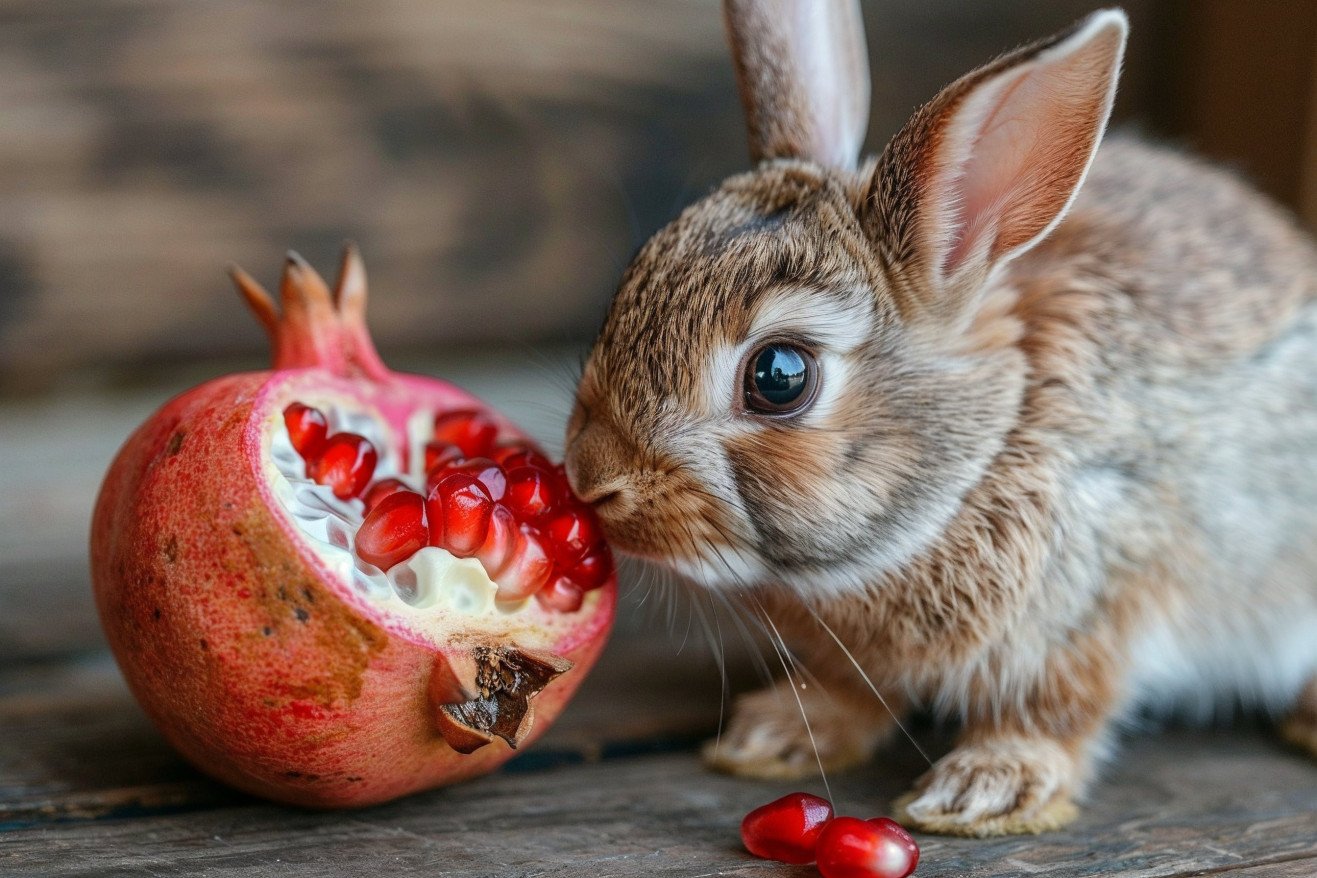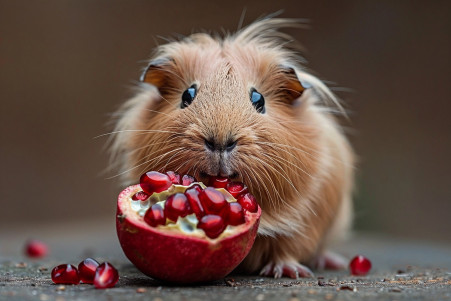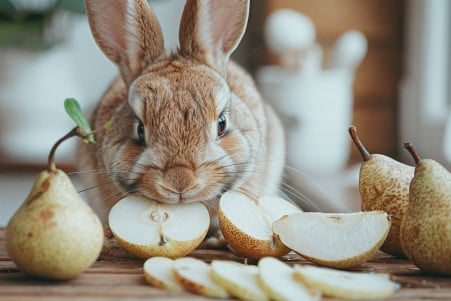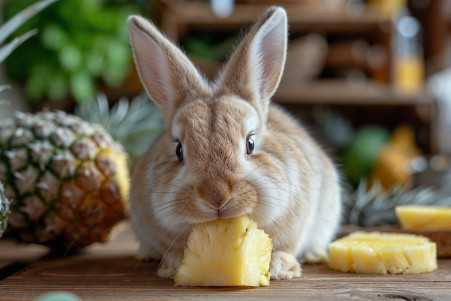Can Rabbits Have Pomegranate? What Vets Say About Bunny Treats
23 May 2024 • Updated 22 May 2024

If you’ve ever wondered whether or not that delicious pomegranate is something you can share with your pet rabbit, you’ll be happy to know that rabbits can have pomegranate in small amounts as a treat. The seeds, arils (the juicy red pulp that covers the seeds), and even some of the white membrane are all edible for rabbits. That said, the skin, as well as the stem and leaves, should be avoided due to the potential for toxicity.
Even though rabbits are herbivores and do well on a diet that consists of hay, fresh vegetables, and a small amount of fruit, it’s still important to know the nutritional content and potential dangers of pomegranate before you add it to your rabbit’s diet. To help you out, we’ve researched the most up-to-date information from veterinarians to make sure we can give you the most accurate information on feeding pomegranate to rabbits and keeping them healthy.
Can rabbits eat pomegranate?
Nutritional Benefits of Pomegranate for Rabbits
Pomegranates are a nutrient-rich fruit that can provide a number of health benefits for rabbits when consumed in moderation. They are packed with antioxidants such as punicalagins and punicalins, which can help fight oxidative stress and strengthen the immune system according to a study mentioned by ScienceDaily. The fiber in pomegranates can also help support a healthy digestive system and prevent constipation.
Moreover, pomegranate peel and extracts have been shown to have a positive impact on the reproductive performance and milk production of female rabbits. A study demonstrated that the addition of pomegranate peel to the diet of rabbit does led to an increase in the number of kits born and weaned, as well as milk yield. The antioxidant activity of the pomegranate peel was suggested as a possible explanation for these results.
That said, pomegranates are high in natural sugars, and while the fiber in the fruit can help offset this, consuming too much can lead to problems such as obesity and dental disease in rabbits. As a result, pomegranates should be fed in small amounts as a treat and in conjunction with a healthy diet that includes lots of hay, fresh vegetables, and a small amount of pellets to ensure rabbits get all the nutrients they need.
Parts of the Pomegranate That Are Safe for Rabbits to Eat
The seeds and arils (the juicy red pulp coverings) of pomegranates are safe for rabbits to eat in small amounts, says Foods Rabbits Should Never Eat. Some of the white membrane that covers the arils is also safe for rabbits to eat.
On the other hand, the skin, branches, and leaves of the pomegranate tree should be avoided because they may contain compounds that are toxic to rabbits, according to Our Lovely Rabbits. It's also best to remove the seeds or pits from the pomegranate before giving it to rabbits because they can be a choking hazard or cause digestive issues.
If you're giving your rabbit pomegranate for the first time, it's best to start with a small amount and watch for any signs of an allergic reaction or digestive upset, according to Our Lovely Rabbits.
How Much and How Often Should You Give Pomegranate to Your Rabbit?
Pomegranate should be given to rabbits in small amounts and as an occasional treat rather than a regular part of their diet. According to EFFECT OF USING POMEGRANATE (PUNICA GRANATUM L.) PEELS AND IT'S EXTRACT ON PRODUCTIVE PERFORMANCE AND MILK YIELD OF DOES RABBIT, the recommended amount of pomegranate for rabbits is 1-2 arils or a small portion of the juicy flesh once or twice a week.
It’s a good idea to start with small amounts and watch for any signs of digestive upset, especially if your rabbit is overweight or has a history of digestive issues. In addition, as mentioned in Can Rabbits Have Pomegranate - The Truth Revealed!, pomegranate should not be given to rabbits younger than 12 weeks old because their digestive systems are still developing and may not be able to handle the fruit.
Rabbits’ diets should be based on unlimited hay, fresh vegetables, and a small number of high-fiber pellets to ensure they’re getting the nutrients they need, according to Can Rabbits Have Pomegranate - The Truth Revealed!. Because pomegranate is high in sugar, overfeeding it to rabbits can lead to problems such as obesity and digestive issues.
Potential Dangers and Warnings of Feeding Pomegranate to Rabbits
Because of its sugar content, excessive pomegranate consumption can lead to potential problems such as obesity, digestive issues, and dental problems in rabbits, according to the Effect of dietary pomegranate by-product extract supplementation on growth performance, digestibility, and antioxidant status of growing rabbit. Rabbits that have diabetes, urinary tract problems, or digestive issues should not eat pomegranate or should eat it in limited amounts.
Pomegranate can also have interactions with certain medications or supplements, so it is important to talk to a vet before giving it to a rabbit. While pomegranate peel extract can help reduce the negative effects of aflatoxin toxicity in rabbits, it is important to make sure that the rabbit is given the right amount and that the right precautions are taken, according to the study published in the Journal of Animal Physiology and Animal Nutrition.
It is also important to make sure that rabbits are watched for side effects, including diarrhea, lethargy, and a lack of appetite, when they are first given pomegranate, according to the guidance from the journal article Effects of Dietary Supplementations of Vitamin C, Organic Selenium, Betaine, and Pomegranate Peel on Alleviating the Effect of Heat Stress on Growing Rabbits.
How to Safely Introduce Pomegranate to Your Rabbit
Because of the potential risks associated with feeding pomegranate to rabbits, it's important to introduce it to their diet slowly. According to Can Rabbits Eat Pomegranate?, you should start by feeding your rabbit small amounts, such as 1-2 pomegranate arils, and watch for signs of an adverse reaction, such as digestive upset or a loss of appetite.
Make sure to remove any seeds, pits, or other parts of the pomegranate that could be toxic, as they can become a choking hazard or cause digestive issues, as mentioned by Can Rabbits Have Pomegranate - The Truth Revealed!. Also, make sure to wash the pomegranate thoroughly to remove any pesticide residue or other contaminants.
It's a good idea to talk to your vet before feeding pomegranate to your rabbit, especially if your rabbit has any health issues or is on any medications, as pomegranate can interact with some medications. As pointed out by the Pomegranate? | Rabbit Talk - Meat Rabbit & Farming Forum, it's important to make sure that your rabbit is getting a well-rounded diet and that pomegranate is only a small part of their overall food intake.
If you follow these guidelines, you can safely introduce pomegranate to your rabbit's diet and potentially give them some of the benefits of this fruit while minimizing the potential drawbacks.
Conclusion: Weighing the Pros and Cons of Giving Pomegranate to Rabbits
The ScienceDirect study revealed that whole pomegranate extract (WPE) is a rich source of bioactive compounds such as syringic acid and eicosapentaenoic acid. The dietary supplementation of WPE at 1,250 or 1,500 mg/kg effectively alleviated the negative impacts of summer heat stress in rabbits. WPE also enhanced the animals' performance, antioxidant status, and anti-apoptotic gene expression in a dose-dependent manner.
Meanwhile, the Tropical Animal Health and Production study showed that pomegranate by-product extract (PBE) supplementation in growing rabbits led to the highest nutrient digestibility, plasma antioxidant levels, and the lowest levels of pathogenic gut bacteria when the rabbits were fed diets containing 200 mg/kg PBE.
Finally, the MDPI Animals journal found that supplementing rabbit diets with pomegranate peel at 20 g/kg improved the negative impacts of heat stress. This included enhanced growth performance, gut health, and antioxidant status compared to the control group.
These studies illustrate how pomegranate and its by-products can be valuable additions to rabbit diets, particularly in situations involving heat stress. This is likely due to the antioxidant and anti-inflammatory properties of pomegranate. Nevertheless, caution and careful dosing are still required when adding pomegranate to rabbits' diets.
Consulting with a veterinarian, especially for rabbits with existing health conditions, is recommended when introducing new foods like pomegranate to their diet.


